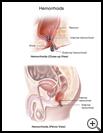
Hemorrhoids: Brief Version
________________________________________________________________________
KEY POINTS
- Hemorrhoids are swollen veins in the lower end of your intestine (rectum) or the anus. They can cause pain, bleeding, and itching.
- Your healthcare provider will treat your hemorrhoids if they are causing discomfort or problems. Treatment may be a diet change, special baths, medicine, or surgery.
- Always tell your healthcare provider when you have rectal bleeding. Although bleeding is often from hemorrhoids, more serious illnesses such as colon cancer, can also cause bleeding.
________________________________________________________________________
What are hemorrhoids?
Hemorrhoids are swollen veins in the lower end of your intestine (rectum) or the anus. The anus is the opening where bowel movements pass out of your body.
Hemorrhoids can happen in 2 places:
- Outside the anus
- Inside the rectum
What is the cause?
If there is too much pressure on the veins around the rectum and anus, you may get hemorrhoids. This can happen when you:
- Strain during bowel movements because you are constipated
- Wait a long time before you have a bowel movement
- Have diarrhea for a few days
- Sit for a long time on the toilet
You are more likely to get hemorrhoids when you:
- Are pregnant or give birth
- Are overweight
- Cough or sneeze a lot
- Sit for a long time
What are the symptoms?
Many hemorrhoids don’t cause any symptoms. If yours are bothering you, you may:
- Itch or bleed from the anus.
- Feel a mild burning
- Have swelling or pain around the anus
- Have pain with bowel movements
- Feel painful lumps around the anus
How are they treated?
Hemorrhoids need to be treated only if they are bothering you or causing problems. Here are some things you can do that usually help:
- Eat foods high in fiber, like whole-grain cereals, fruit, and vegetables.
- Drink lots of water.
- Sit in a lukewarm bath 2 or 3 times a day for 15 minutes.
- Put cold packs on the anus to relieve pain.
- Try creams or ointments. Ask your healthcare provider what would be best for you.
You may need other kinds of treatment. There are other ways to take away or shrink hemorrhoids. For example, your healthcare provider could:
- Put tight bands around the hemorrhoids so that they dry up and fall off
- Freeze the hemorrhoids
- Destroy the hemorrhoids with electrical or laser heat or infrared light
- Give a shot around the swollen vein to shrink it
If you have bad hemorrhoids, you may need surgery to cut out the hemorrhoids.
How can I take care of myself?
Always tell your healthcare provider if you have bleeding from the anus. Sometimes a serious illness may cause the bleeding. It's best to make sure it’s not something more serious.
If you have hemorrhoids, or you want to keep from having hemorrhoids:
- Ask your healthcare provider what you should use to help with pain and itching.
- Wipe gently after a bowel movement. Wipe with soft, moist toilet paper, or with moist towelettes or baby wipes. If you need to, shower instead of wiping. Dry the anus gently.
- Don’t strain during bowel movements. Take a stool softener if your healthcare provider recommends it.
- Don't use too many laxatives. Irritation from diarrhea can cause hemorrhoids.
- Don't lift heavy objects. This may put more pressure on the veins and make the hemorrhoids worse.
- Get enough exercise, which can help prevent constipation.

